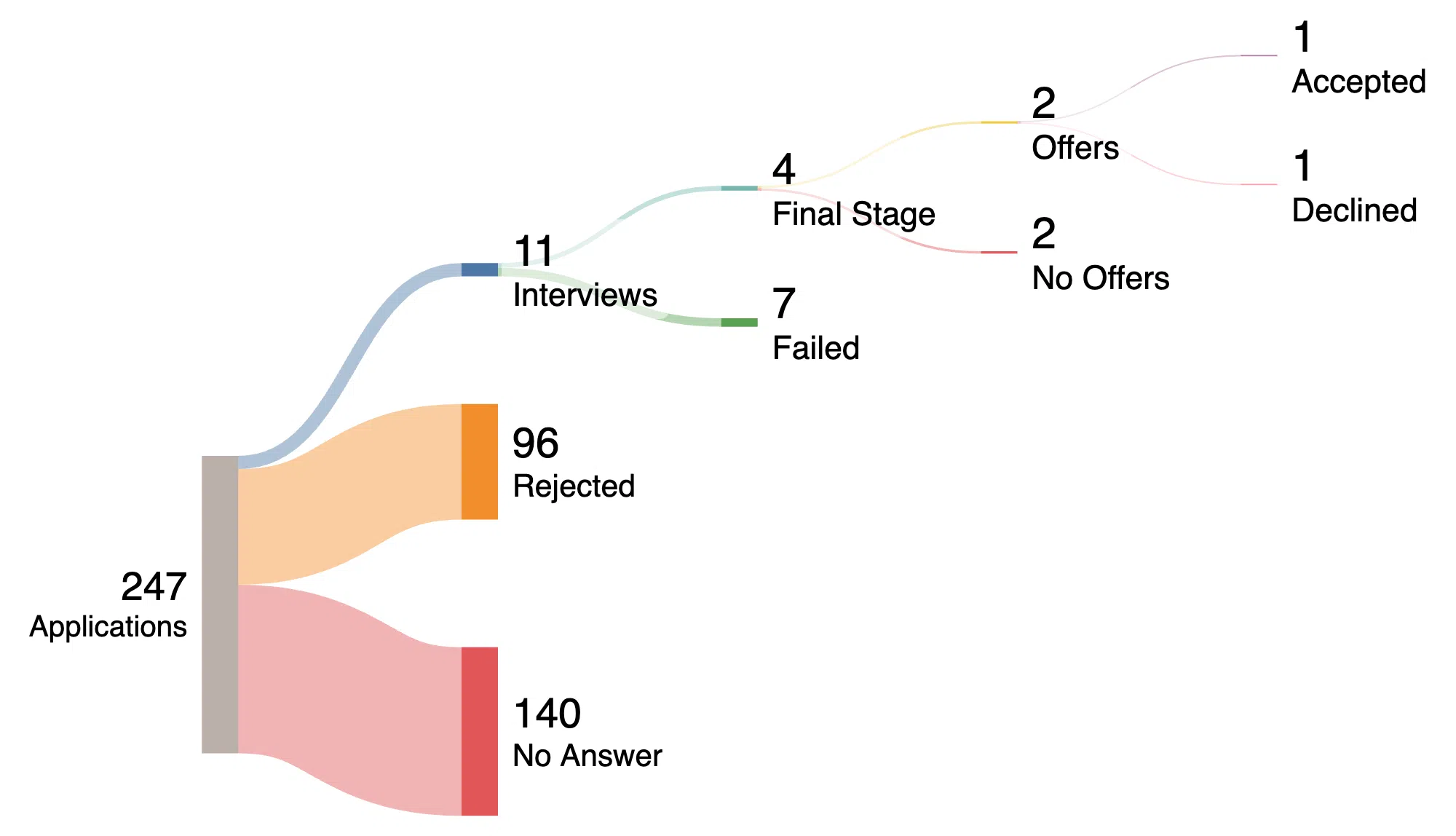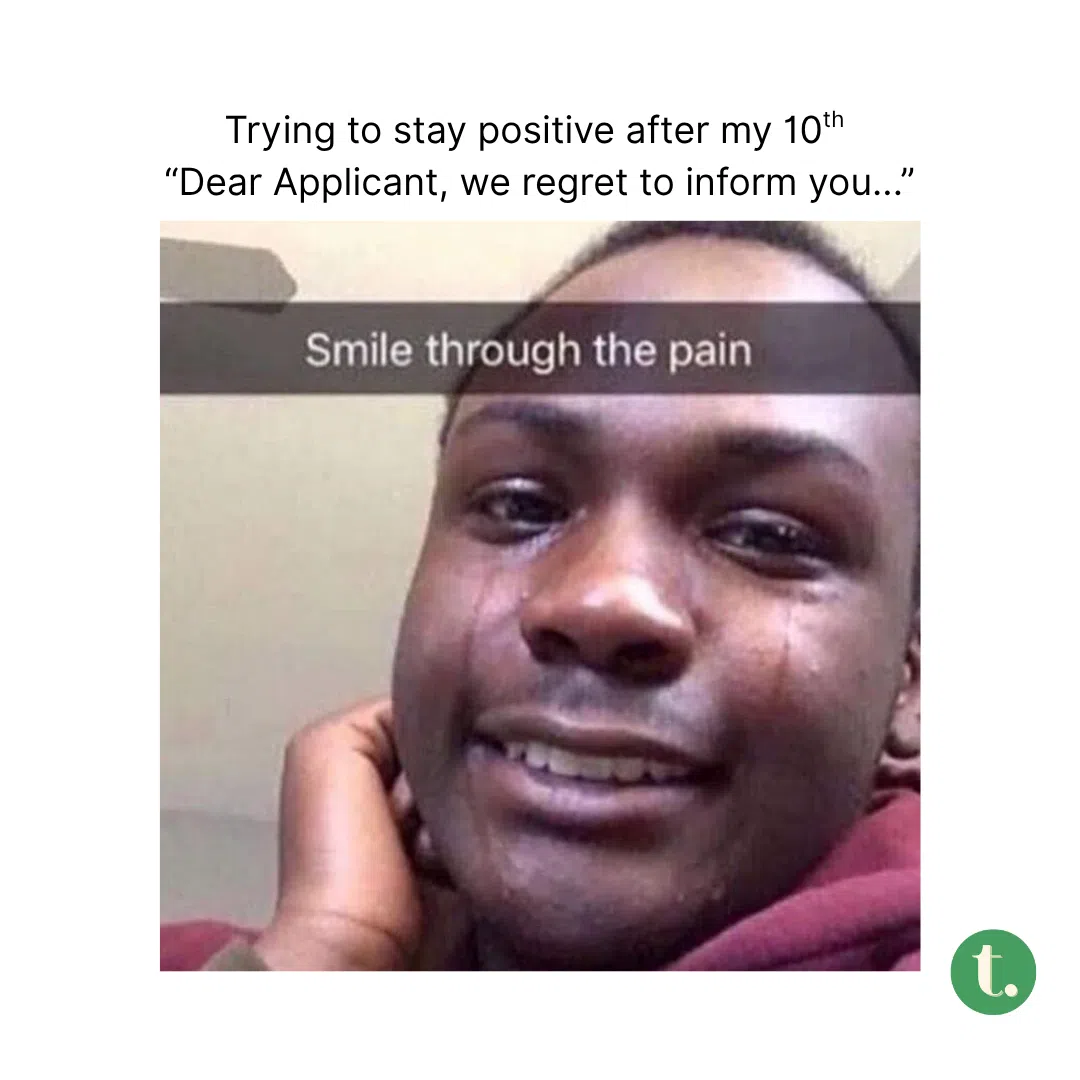🙅 Apply, get rejected, repeat: Surviving the job hunt as a Gen Z

Straight to your inbox. Money, career and life hacks to help young adults stay ahead.
[SINGAPORE] Emily Ong, a 24-year-old fresh graduate from Nanyang Technological University (NTU), applied to over a hundred full-time positions and attended dozens of interviews. But most of her applications fell through.
“It is disheartening and honestly, a little scary. I began doubting whether I would be able to secure a job at all,” she says.
Aaron (not his real name) would know. The 25-year-old graduate from the National University of Singapore (NUS) applied for almost 250 roles but was only invited to 11 interviews.
After a four-month job search, he received two offers and is now employed as a full-time software engineer.
“Rejections are the norm,” says Aaron, who charted out how his job hunt went.

Job searching has gotten tougher in recent times as more university grads are competing for fewer jobs.
Navigate Asia in
a new global order
Get the insights delivered to your inbox.
In 2024, 79.5 per cent of fresh grads from five autonomous universities in Singapore found full-time permanent jobs, down from 84.1 per cent in the year before. Fresh grads from private universities fared worse, with less than half – 46.4 per cent, down from 58.7 per cent in 2023 – finding full-time jobs within six months of graduating.
With increased competition, fresh grads say they’re treating their job hunt like a numbers game. Be persistent, cast your net wide and eventually a company will catch the bait.
Like Emily and Aaron, several other fresh grads say they’ve sent out hundreds of job applications in their job hunt. One even tells me she sets a weekly target number of resumes to send out to keep herself from giving up.
🔢 Numbers game
But do mass applications directly translate to increased opportunities?
A friend graduating from NUS this year explains that she prefers being selective with her applications, as she believes “playing the numbers game” will not work for her.
“It only adds to the mental toll,” she says, adding that mass applications may lead to heightened anxiety and stress.

While applying to listings in bulk may theoretically increase your chance of landing an interview, it may not be the most efficient method in the long run.
Across the board, career coaches I spoke with agreed: tailoring resumes and advocating for your work yields better results and is less damaging for one’s mental health.
Whether it is messaging recruitment managers directly or submitting a creative pitch, intentionality matters. Focusing on a select few roles and companies may yield better outcomes, says Cindi Wirawan, a career coach at Cindiw, which offers career training services.
💔 Job rejections sting
I distinctly recall receiving my first rejection e-mail. It was a quiet yet forceful hit to my confidence.
But was I simply too emotional? Well, no.
In fact, studies show that social rejection can activate the same regions in the brain associated with physical pain. Hence, it is natural to feel upset when you’re turned down by companies, especially when much of our identity is influenced by what we do.

Job rejections can also feel deeply personal and hit harder for fresh grads, since their professional identity is still forming, Wirawan tells thrive.
📋 Possible reasons for job rejections
Although hiring turn-downs can feel like a personal failure, they seldom are, says Angel Kilian, founder of Career inFocus – a career consultancy.
A rejection at the early stage of the hiring process may simply be a result of your resume getting lost in a sea of applications.
Contrary to popular belief, most applicant tracking systems that human resource departments use do not rank resumes based on the number of “keywords” that appear in the resume, she says.
“That’s a big myth. If that day is your lucky day and the recruiter goes over your name, they see your resume. If not, they don’t,” Kilian explains.
Still, as employers increasingly favour the use of AI to screen candidates, including relevant keywords in your resume remains a smart move.

Rejections may also include factors beyond an applicant’s control. Janice Chua, a freelance corporate coach, lists possible reasons why companies decline candidates:
- Hiring freezes and budget cuts: Some employers may retract positions due to internal cost-cutting measures.
- Hidden internal hires: Some postings are merely compliance formalities to meet Singapore’s employment regulations, and the role may already be reserved for an internal transfer or referral.
- Intense competition: Some employers may shortlist only “top-tier” local university grads, creating an uneven playing field for others.
Rejections may not necessarily be a reflection of one’s capabilities. Instead, timing and cultural fit are common reasons for turn-downs, too, Wirawan says.
🦘 Bouncing back
We tend to be our own worst critics, so always remember to give yourself grace. Besides, silencing the inner gremlin that says you are not good enough is no easy task.
For starters, ask yourself, “How can I make this work for me?” Framing the fear of rejection can redirect your energy into concrete steps forward, Chua says.
For example, try reaching out directly to the recruiters instead of merely applying through job portals. Kilian says that when her clients do that, their chances of landing an interview jump up significantly.
Instead of taking rejections at face value, consider seeking feedback from recruiters to understand why you were not chosen and improve your skills for future interviews.
Roy Chua, 25, has learnt to cut himself more slack whenever he gets rejected. The product manager took nine months to land a job, receiving only five offers after sending out hundreds of applications.
“There are times when it is demoralising, but I’ve learnt not to take these rejections to heart,” he says.
TL;DR
- Fresh grads struggling to find jobs are resorting to playing the “numbers game”
- Often, that leads to receiving hundreds of rejections at a time, which can take a toll on their self-esteem
- Job rejections feel personal, but they are rarely so
- Focus on the changes you can control and adopt a growth mindset
Decoding Asia newsletter: your guide to navigating Asia in a new global order. Sign up here to get Decoding Asia newsletter. Delivered to your inbox. Free.
Copyright SPH Media. All rights reserved.


